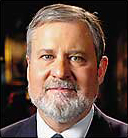
Fr. George Rutler (Weekly Column, July 8, 2018):
There is no limit to the excuses ideologues will make to promote theory over fact. Consider attempts to justify Aztec human sacrifice in the interest of “multiculturalism.” Archeological discoveries of massive numbers of victims are being explained away as not really significant. The estimable scholar, Victor Davis Hanson, has written: “For the useful idiot, multiculturalism is supposedly aimed at ecumenicalism and hopes to diminish difference by inclusiveness and non-judgmentalism. But mostly it is a narcissistic fit, in which the multiculturalist offers a cheap rationalization of non-Western pathologies . . .”
Like hyperbole about the Spanish Inquisition, refuted by the latest scholarship, the “Black Legend” would have us believe that the Spaniards destroyed a benign and creative civilization in Mesoamerica. The Franciscan friar Bernardino de Sahagún, a missionary and pioneer anthropologist who translated the Gospel into the Aztec Nahuatl language, represents the best of a not unblemished Hispanic cultural imperative that led to the abolition of human sacrifice, though at a cost, for many Spaniards were cannibalized by the Acolhuas, Aztec allies. Similarly, it was the influence of Christian missionaries like William Carey that banned the Hindu practice of “sati,” the cremation of widows on their husbands’ funeral pyres in the Indian principalities. Between 1815 and 1818, 839 widows were burnt alive in Bengal province alone. A general ban was enforced by Queen Victoria in 1861, the year her own husband died, but sati was still practiced in Nepal until 1920.
One estimate has 80,400 Aztec captives sacrificed in 1487 at the re-consecration of the Great Pyramid of Tenochtitlán. Although the actual figure may have been lower, the cutting out of hearts from victims still alive is an intolerable barbarity, graphically depicted in the film Apocalypto, which shows such rites among the earlier Mayan people. A mixed-race descendant of Cortez, Fernando de Alva Cortés Ixtlilxóchitl, calculated that 20% of the infants and children in the general “Mexica” area were sacrificed annually to appease rain deities, along with men and women sacrificed in honor of the serpentine god Quetzalcóatl, the jaguar god Tezcatlipoca and the aquiline warrior god Huitzilopochtli.
In the sixteenth century, Montaigne, anticipating Dryden’s “noble savage,” sought to cut the primitive cultures a little slack because he saw barbaric acts among his own European peoples. Those who were scandalized by his analogy then are like those today who commit atrocities under the veneer of progressivism. In 1992, a writer in the leftist Die Zeit of Hamburg rhetorically bent over backwards to deny that the Mesoamericans had committed human sacrifice. We know what happened in his own country among the National Socialist eugenicists.
Sacrifices on the altars of ancient temples cannot match the millions of infants aborted today in sterile clinics. Pope Francis has said, “Last century, the whole world was scandalized by what the Nazis did to purify the race. Today, we do the same thing but with white gloves.” Perhaps five centuries from now, revisionists will deny that abortion was ever legal.

 Claire Chretien, "
Claire Chretien, ".png) I read the novel Silence by the Japanese Catholic author, Shusaku Endo, years ago when I lived in Japan. He's called the "Japanese Graham Greene." With good reason. Like Greene, he's a darn good novelist. Also like Greene, his Catholicism in his writings is ambiguous. I don't hold that against him as a novelist. Some of my favorite Catholic novelists are also ambiguous about the Catholic faith in their writings, even though they are clearly and intentionally Catholic, like Walker Percy or Evelyn Waugh.
I read the novel Silence by the Japanese Catholic author, Shusaku Endo, years ago when I lived in Japan. He's called the "Japanese Graham Greene." With good reason. Like Greene, he's a darn good novelist. Also like Greene, his Catholicism in his writings is ambiguous. I don't hold that against him as a novelist. Some of my favorite Catholic novelists are also ambiguous about the Catholic faith in their writings, even though they are clearly and intentionally Catholic, like Walker Percy or Evelyn Waugh.

 Larry P. Arnn, President, Hillsdale College, "
Larry P. Arnn, President, Hillsdale College, "